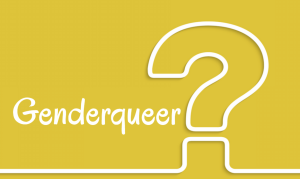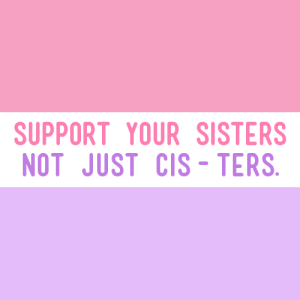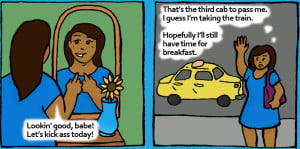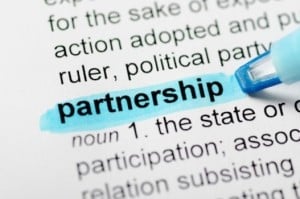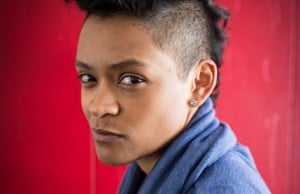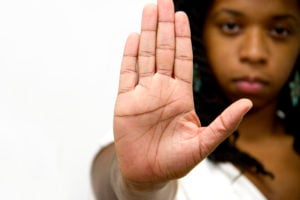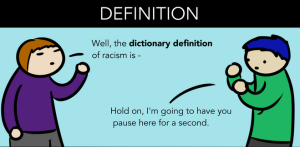While trans folks and trans issues are slowly entering into the mainstream consciousness, there are still many questions that get left unanswered.
Because of this, many trans folks are left to answer these questions themselves.
I know that many of these questions get asked because many people just don’t know any better, or don’t know where they can go to have these questions answered.
So, I am here to answer the top ten questions I get asked as a genderqueer person so that you have a reference points for what the media just hasn’t answered for you.
1. “So Are You a Boy Or a Girl?”
We live in a society that has conditioned us to believe that there are only two, binaried genders (man and woman).
However, the gender binary isn’t an objective truth (in fact, it’s been used as a tool of colonialism) and there are in fact many different identities that do not fall within the binary gender system.
It is also important to realize that not being a boy or a girl does not always mean that you are somehow a combination of the two.
There are definitely a load of people who identify as a combination of those two genders, as well as people who float between the two.
But, there are also people whose gender has nothing to do with “boyness” or “girlness” at all.
So, when someone tells you that they are genderqueer, don’t ask them if they are a boy or a girl, because most of the responses you will get will be “both” or “neither” (or my favorite, “no”).
2. “No, But What Are You Really?”
This question, which is frequently asked, can mean one of two things.
Option A is “I know you’re telling me that you’re not a boy or a girl, but, like, what side of the ‘spectrum’ are you closer to?”
Personally, I reject ideas of “spectrums” (in regards to gender and sexuality).
This is because spectrums rely on a binary that puts boy at one end and girl at the other, which relies on the belief that all genders are iterations of boyness or girlness and that girlness and boyness are somehow “opposites” of one another.
Instead I like to imagine gender as a cosmos, infinite possibilities and infinite combinations of those possibilities, “girl” and “boy” are just two options within that cosmos.
Personally, I exist within some sort of genderless flamboyant place between limp wrists and tea length skirts. I am not “really” a trans boy simply because I am not cis and dfab (designated female at birth).
Which bring us to the second meaning of this question, option B: “But what does it say on your birth certificate?”
Pro tip: Don’t ask a trans person this question. Any questions that pry into the lives of trans people in a way that looks to “uncover” parts of themselves that they do not identify with is harmful and offensive.
While it may not seem like a big deal to someone who identifies with what was placed on their birth certificate, to trans folks it is invasive and hurtful.
3. “But What About Biology?”
Many people have looked towards biology to say that trans people are “really” the gender they were assigned at birth. This type of thinking is based on western scientific understandings of the body, which are just as socially constructed as ideas of gender.
In an awesome article entitled “No, Kevin D. Williamson, Sex Is Not a Biological Reality,” Samantha Allen writes:
“Bodies are real, yes. Bodies even have certain characteristics that may or may not relate to reproduction, yes. But “sex” is not a biological reality. “Sex” is our way of making sense of bodily difference in a world committed to the notion that there are two distinct and inalterable genders…
“Sex and gender are both socially influenced systems of categorization – the difference is that sex is allowed to posture as objective, biological, and pre-social. Sex is a reflection of our social commitment to a two-gender world.”
So, while science might posture as something objective, it actually plays a lot into socially constructed ideas of sex and gender.
4. “Which Bathroom Do You Use?”
Considering that many places do not have gender-neutral bathrooms, this question is a hard one to answer.
Bathroom politics play a big role in trans people’s lives. Depending on how you look and where you are, going to the bathroom can be extremely dangerous.
This is why it is important to try and get more gender neutral bathrooms in public places, allowing trans kids in school to choose the bathroom they feel the most comfortable in, and most importantly, not questioning someone if you feel like they “don’t belong” in the bathroom they are in.
5. “Are You Gonna Get ‘The Surgery’?”
Surgery seems to always be a focal point when cis people try to talk about trans bodies.
This focus strips trans people of their personhood and makes them out to be a lump of flesh for you to poke and prod and wonder about.
While many folks may chalk this type of question up to curiosity, what is actually taking place is putting curiosity before the comfort and safety of trans folks.
A lot of the ways in which trans folks have been dehumanized is through only talking about physical aspects of trans people’s bodies, which erases or devalues their lived experiences, emotions, dreams, opinions, and voices.
This being said, some genderqueer folks want surgery (and no this does not make them “really” one binary gender or another) and some don’t (which is true for all trans people).
In fact, contrary to popular belief, non-cis folks do not define themselves by a hatred of their own bodies.
Some genderqueer folks want some type of surgery and not another, some want to go on hormones, some do not, and some are perfectly fine with their bodies as they are (yes non-op trans people exists).
6. “‘They’ for a Singular Person Is Grammatically Incorrect!”
Yeah, I know this isn’t a question, but it’s something I hear so often that it needs to be addressed here.
So let me break it down for you:
Most people I know who say stuff like this will only bring up grammar when we are talking about gender-neutral pronouns, which is messed up because they’re simply deflecting from the real issue.
And that is that they’re unwilling to use the correct pronouns for a trans person in their life.
Also, being a snob about grammar is classist, racist, and ableist. (And look! One of my lovely editors already wrote a whole piece explaining why this is so!)
“They” as a singular gender neutral pronoun actually isn’t “grammatically incorrect.” (I know, I’m blowing your mind right left and center today)
So, please, stop using “grammar” to hide your casual transphobia. It’s not cute, and it’s also not real.
7. “Why Do You Have Boobs One Day and a Flat Chest Another?”
For this question, I used visible breasts versus flat chests as an example because this is the one I encounter the most, but this question can occur with any visible traditional gender signifier (body/facial hair, visible genital bulge, “gendered” body language, or voice tonality).
Personally, you can see my boobs sometimes because binders (a tight tank top style article that compresses the chest) are hot and uncomfortable, and top surgery is fucking expensive (not to mention that those things are a sensory nightmare).
But, for many folks, playing with visible gender signifiers is what makes being genderqueer or non-binary so much fun (yes, I said “fun” – in fact, trans people’s lives aren’t a constant stream of misery and torment).
Some folks may want to present a certain way one day and present a different way on another day.
Someone’s physical presentation can have a lot to do with a variety of different factors.
These include limited access to surgeries and hormones, their physical safety, whether or not they are out to certain people, their physical or emotional comfort, sensory differences, or simply how they are feeling about their body that day.
It’s important to remember that, no matter how a trans person presents, they are still the gender that they identify with. I am non-binary so I look non-binary, regardless of what that looks like.
For example, I have sensory issues and physical conditions that make it impossible for me to wear a binder on a regular basis. I also happen to love dresses and skirts.
Presenting myself with a visible chest in “girly” clothing (how do inanimate objects have a gender?) doesn’t somehow erase the fact that I’m a non-binary trans person.
8. “Are You Dysphoric?”
For those not in the know, dysphoria is a feeling of unease. In the context of gender, dysphoria refers to a state of being in a state of unease with certain aspects of your body that occurs when the gender someone is assigned does not align with their actual gender.
While many trans folks experience dysphoria, you don’t need to be unhappy with your body to be trans.
In fact, the idea that you need to have dysphoria to be trans relies heavily on a medicalized idea of transness and ignores the fact that trans and non-binary people have been living their lives without hormones and surgery for a very long time.
Many trans folks, including myself, have noted that sometimes dysphoria comes from the way in which others view you based off of your body.
For instance, having a visible chest signifies to many people that you’re a woman or a girl. Being seen as a woman or a girl makes you extremely uncomfortable, not the physical presence of your chest alone. (This isn’t true for all trans people, but is true for some. This is called social dysphoria.)
This being said, dysphoria is not something that only binary trans people experience. Wanting to go on hormones or have surgery does not somehow make you a binary trans person.
Surgery and hormones do not magically send you hurtling through the imaginary gender “spectrum” from one end to another. A genderqueer person is genderqueer no matter what you think their body looks like.
9. “Am I Gay If I Think You’re Hot?”
I don’t blame you for thinking I’m hot. My hotness, unlike biological “sex,” is an objective truth (am I joking? I don’t know).
Most of the time, I get this question from straight men. And most of the time, it comes out of an inner crisis they begin to have when they realize I am not a girl, but they thought I was hot before knowing that.
This type of question makes me uncomfortable because I feel like I’m suddenly being asked to somehow quell this inner turmoil I have stirred within straight men.
I also must point out that out of this question can come the classic transphobic trope of “trans folks are tricking straight men into engaging in queer sexuality,” which is almost entirely directed at trans women and trans feminine people (which I’m not), and can result in fatal reactions.
For genderqueer folks, like myself, posing this sort of question relies on another binary, a gay/straight binary, under which I do not fall.
So, your sexuality is something that you are going to have to figure out for yourself, but I know for a fact that when a cis guy is attracted to me, I don’t suddenly become a woman to make him more comfortable.
As for straight women, I do not make you a lesbian if you think I am hot, because I am not a woman.
10. “What Kind of Sex Do You Have?”
This question, no matter how you phrase it, is always invasive and uncomfortable.
In fact, assuming I have sex at all makes me uncomfortable. Queer and trans folks are constantly thrust into a space of hypersexualization.
By being queer or trans folks think it’s suddenly okay to start asking personal questions about your sex life. Are we going to have sex with you? No.
So why do you care?
***
When you meet someone different from you, you want to ask questions to learn something new. However, when it comes to the questions that trans folks get asked, many of them can be invasive and offensive.
So, next time you feel like asking someone one of the above questions, you should probably just ask them what their favorite color is (purple) or if they like to play Dungeons and Dragons (yes, and if you’re in the LA area and want to play, my e-mail is in my bio).
This way you get to learn something useful and fun about someone else instead of making them feel uncomfortable.
And if you are interested in learning more about genderqueer, and other trans experiences, there are tons of resources online to help you out.
In fact, Everyday Feminism has tons of awesome articles for folks wanting more info on trans experiences, so when you’re done with this article, go check out some more!
[do_widget id=’text-101′]
Kris Nelson is a Contributing Writer for Everyday Feminism. They run a blog full of short queer-centric radical prose, which can be found at thequeertimes.tumblr.com and a poetry blog that can be found at songswithoutlyrics.tumblr.com. Kris also runs an online store by the name of Spell-Bound, where they sell handcrafted wire work jewelry, crystal pendants, hand sewn tarot bags, and pendulums. They can be contacted at [email protected] and trans-witch.tumblr.com.
Search our 3000+ articles!
Read our articles about:
Our online racial justice training
Used by hundreds of universities, non-profits, and businesses.
Click to learn more


